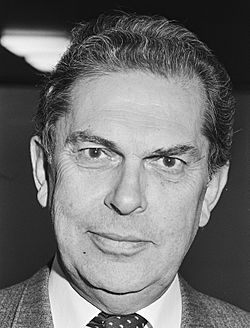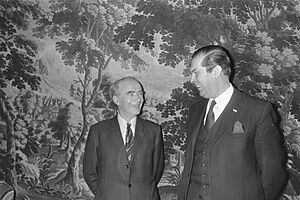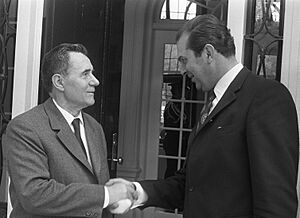Barend Biesheuvel facts for kids
Quick facts for kids
Barend Biesheuvel
|
|
|---|---|

Biesheuvel in 1982
|
|
| Prime Minister of the Netherlands | |
| In office 6 July 1971 – 11 May 1973 |
|
| Monarch | Juliana |
| Deputy | Roelof Nelissen Molly Geertsema |
| Preceded by | Piet de Jong |
| Succeeded by | Joop den Uyl |
| Deputy Prime Minister | |
| In office 24 July 1963 – 5 April 1967 Serving with Anne Vondeling (1965–1966)
Jan de Quay (1966–1967) |
|
| Prime Minister |
See list
|
| Preceded by | Henk Korthals |
| Succeeded by | Johan Witteveen Joop Bakker |
| Minister of Agriculture and Fisheries |
|
| In office 24 July 1963 – 5 April 1967 |
|
| Prime Minister |
See list
|
| Preceded by | Victor Marijnen |
| Succeeded by | Pierre Lardinois |
| Minister for Suriname and Netherlands Antilles Affairs |
|
| In office 24 July 1963 – 5 April 1967 |
|
| Prime Minister |
See list
|
| Preceded by | Henk Korthals |
| Succeeded by | Joop Bakker |
| Parliamentary leader in the House of Representatives |
|
| In office 7 December 1972 – 7 March 1973 |
|
| Preceded by | Willem Aantjes |
| Succeeded by | Willem Aantjes |
| In office 23 February 1967 – 6 July 1971 |
|
| Preceded by | Bauke Roolvink |
| Succeeded by | Willem Aantjes |
| In office 5 June 1963 – 24 July 1963 |
|
| Preceded by | Henk van Eijsden |
| Succeeded by | Jan Smallenbroek |
| Parliamentary group | Anti-Revolutionary Party |
| Leader of the Anti-Revolutionary Party |
|
| In office 5 June 1963 – 15 May 1973 |
|
| Deputy |
See list
|
| Preceded by | Sieuwert Bruins Slot |
| Succeeded by | Willem Aantjes |
| Member of the European Parliament |
|
| In office 7 March 1961 – 24 July 1963 |
|
| Parliamentary group | Christian Democratic Group |
| Constituency | Netherlands |
| Member of the House of Representatives |
|
| In office 7 December 1972 – 7 March 1973 |
|
| In office 23 February 1967 – 6 July 1971 |
|
| In office 6 November 1956 – 24 July 1963 |
|
| Parliamentary group | Anti-Revolutionary Party |
| Member of the Social and Economic Council |
|
| In office 20 March 1956 – 1 July 1959 |
|
| Chairman | Frans de Vries (1956–1958) Gerard Verrijn Stuart (1958–1959) |
| Personal details | |
| Born |
Barend Willem Biesheuvel
5 April 1920 Haarlemmerliede, Netherlands |
| Died | 29 April 2001 (aged 81) Haarlem, Netherlands |
| Cause of death | Cardiovascular disease |
| Political party | Christian Democratic Appeal (from 1980) |
| Other political affiliations |
Anti-Revolutionary Party (until 1980) |
| Alma mater | Free University Amsterdam (LL.B., LL.M.) |
| Occupation | Politician · civil servant · Jurist · Businessperson · Banker · Corporate director · Nonprofit director · Trade association executive · Lobbyist |
Barend Willem Biesheuvel (; 5 April 1920 – 29 April 2001) was a Dutch politician and a jurist. He was a member of the now-closed Anti-Revolutionary Party (ARP), which later became part of the Christian Democratic Appeal (CDA) party. Biesheuvel served as the Prime Minister of the Netherlands from July 1971 to May 1973.
He was known for being a skilled manager and a good debater. During his time as Prime Minister, his government worked on making the public sector more efficient. They did this by reducing rules (called deregulation) and allowing private companies to take over some services (called privatization).
Contents
Early Life and Career
Barend Willem Biesheuvel was born on 5 April 1920 in Haarlemmerliede, a town in the province of North Holland. His family belonged to the Reformed faith.
After finishing school, he studied law at the Free University Amsterdam. He earned a Master of Laws degree in September 1945. For a few years, he worked as a civil servant for the government of North Holland.
From 1952, Biesheuvel became involved with the Christian Farmers and Gardeners Association of the Netherlands (CBTB). He served as its general secretary and later became its chairman in 1959.
Political Journey
Biesheuvel began his political career in 1956. He became a Member of the House of Representatives, which is the lower house of the Dutch parliament. He represented the Anti-Revolutionary Party. In this role, he spoke about topics like agriculture and local government.
From 1961 to 1963, he was also a Member of the European Parliament. This meant he worked on issues affecting Europe as a whole.
In 1963, Biesheuvel became the leader of the Anti-Revolutionary Party. He was also chosen as the party's main candidate (called a Lijsttrekker) for the general election that year.
Serving as Deputy Prime Minister
After the 1963 election, Biesheuvel was appointed Deputy Prime Minister of the Netherlands. He also became the Minister of Agriculture and Fisheries. On top of that, he was responsible for matters concerning Suriname and the Netherlands Antilles. He held these important roles in several governments, including the Marijnen cabinet, the Cals cabinet, and the Zijlstra cabinet, from 1963 to 1967.
Return to Parliament
In 1967, Biesheuvel returned to the House of Representatives. He became the leader of his party's group in parliament. He also led committees on shipbuilding and government information.
Becoming Prime Minister
Biesheuvel was again the main candidate for his party in the 1971 general election. After the election, he successfully formed a new government, known as the First Biesheuvel cabinet. He then became the Prime Minister of the Netherlands on 6 July 1971.
His first government lasted about a year. It faced challenges and eventually fell in July 1972. Biesheuvel then led a temporary government, the Second Biesheuvel cabinet, while a new government was being formed.
For the 1972 election, Biesheuvel was once again the main candidate. However, the election results led to a new government led by Joop den Uyl from the Labour Party. Biesheuvel stepped down as Prime Minister on 11 May 1973. He also announced his retirement from politics and left his role as party leader shortly after.
Life After Politics
After leaving active politics at age 53, Barend Biesheuvel continued to be involved in public life. He held many important positions in both private companies and public organizations. For example, he was chairman of the board for the National Investment Bank. He also served on various government committees and councils.
Biesheuvel remained interested in politics and worked as a lobbyist for the European Union. He strongly supported the idea of more European integration, which means countries in Europe working more closely together.
Biesheuvel continued to share his thoughts on political matters as a respected statesman until his death. He passed away on 29 April 2001, at the age of 81, due to cardiovascular disease.
Personal Life
Barend Biesheuvel married Wilhelmina Jacoba "Mies" Meuring on 22 November 1945. They had two daughters and one son. Mies Meuring passed away in 1989. Barend Biesheuvel was buried with his wife at the main cemetery in Bloemendaal.
Awards and Honours
Biesheuvel received several important awards for his service to the Netherlands:
| Honours | ||||
| Ribbon bar | Honour | Country | Date | Comment |
|---|---|---|---|---|
| Commander of the Order of the Netherlands Lion | Netherlands | 8 June 1973 | ||
| Knight Grand Cross of the Order of Orange-Nassau | Netherlands | 21 March 1991 | Elevated from Grand Officer (27 April 1967) | |
See also
 In Spanish: Barend Biesheuvel para niños
In Spanish: Barend Biesheuvel para niños
 | Jackie Robinson |
 | Jack Johnson |
 | Althea Gibson |
 | Arthur Ashe |
 | Muhammad Ali |



